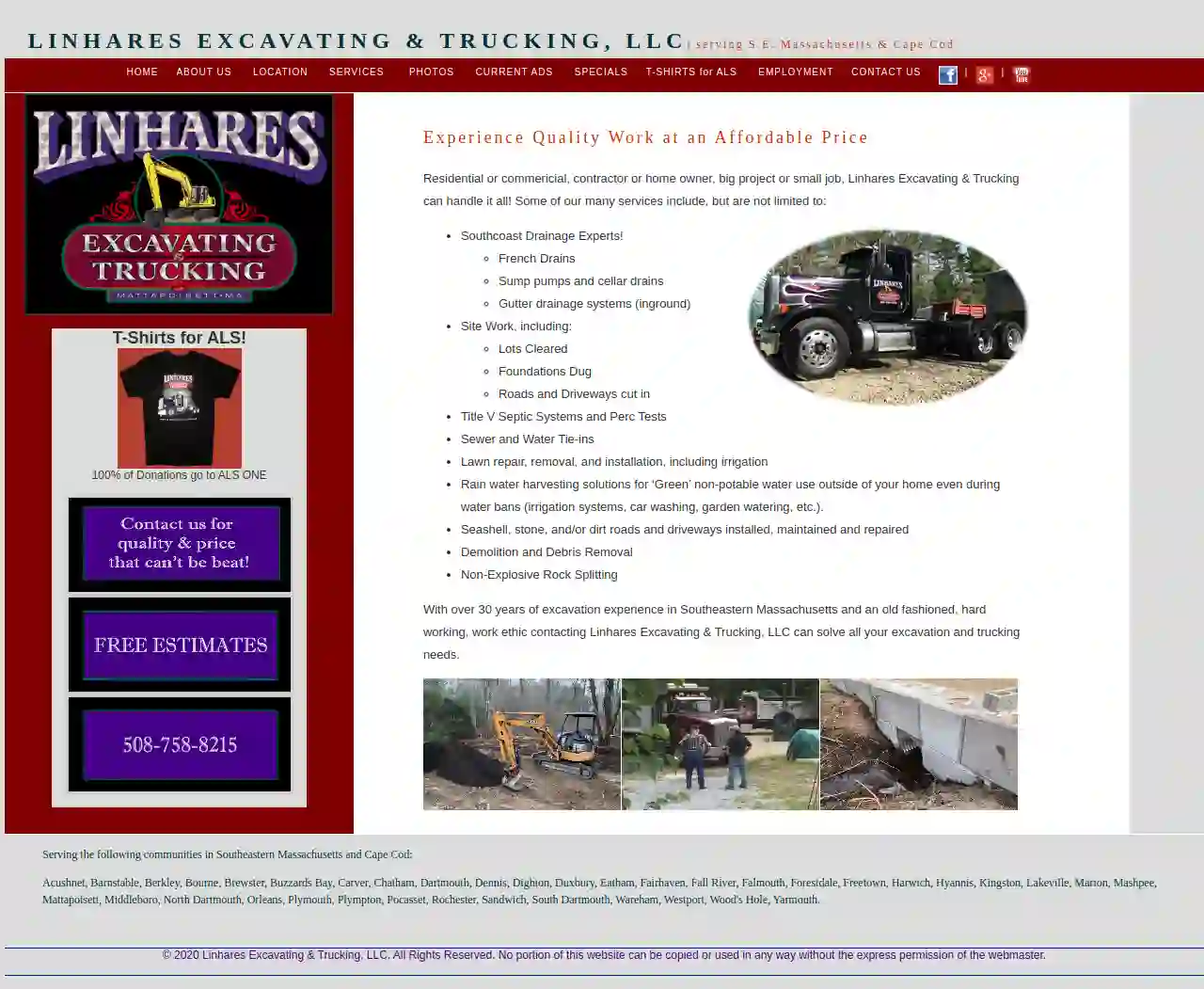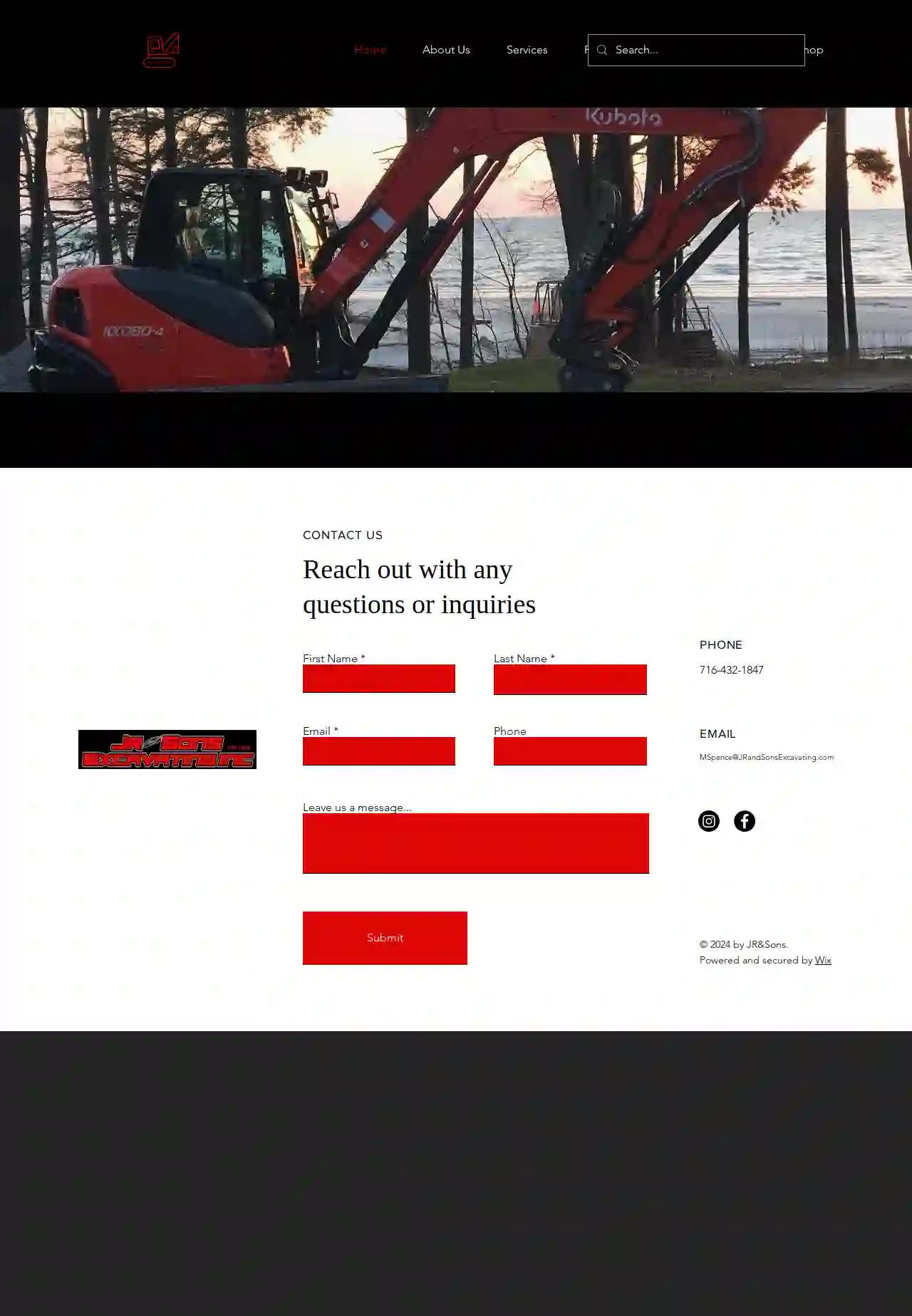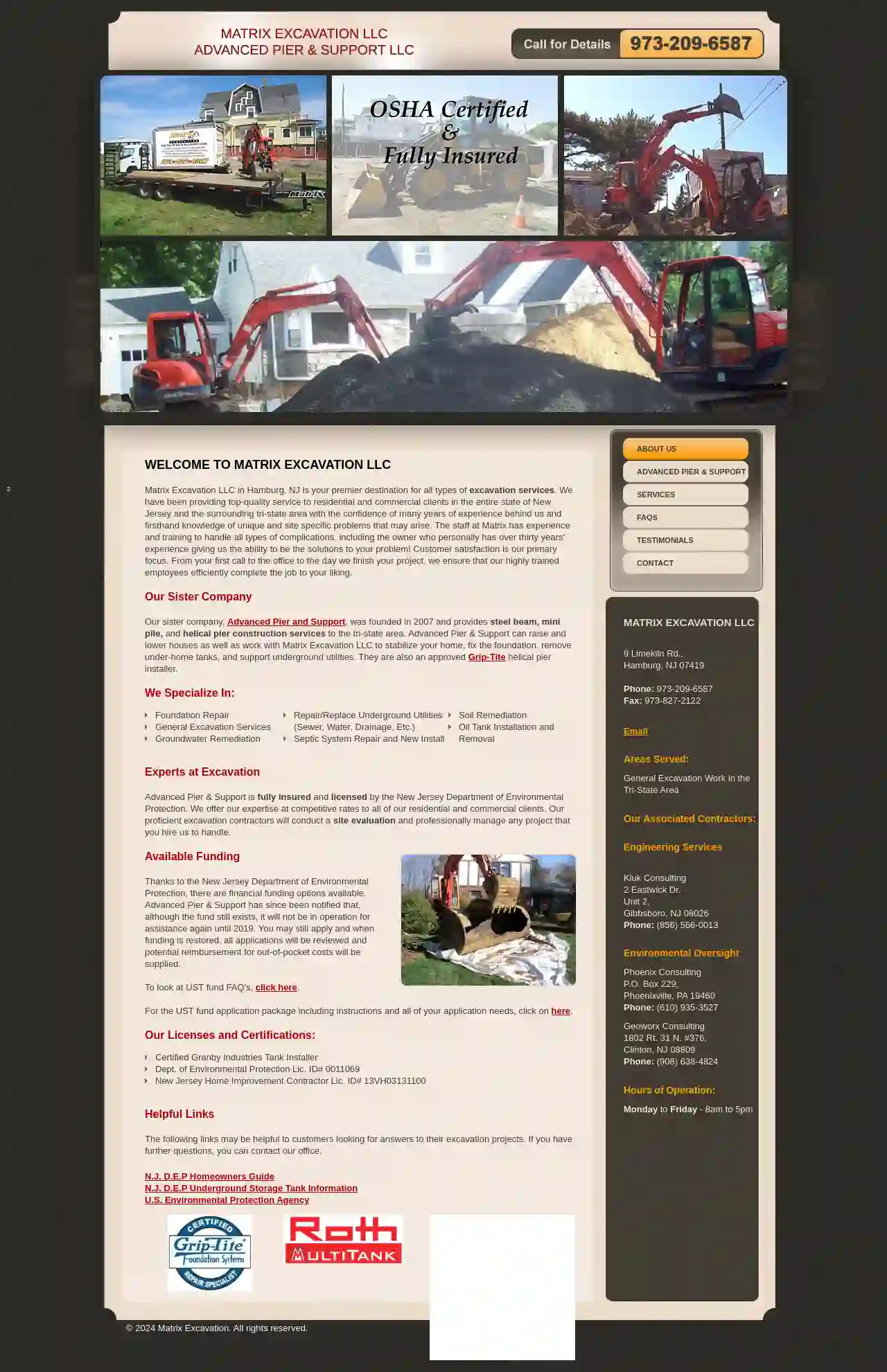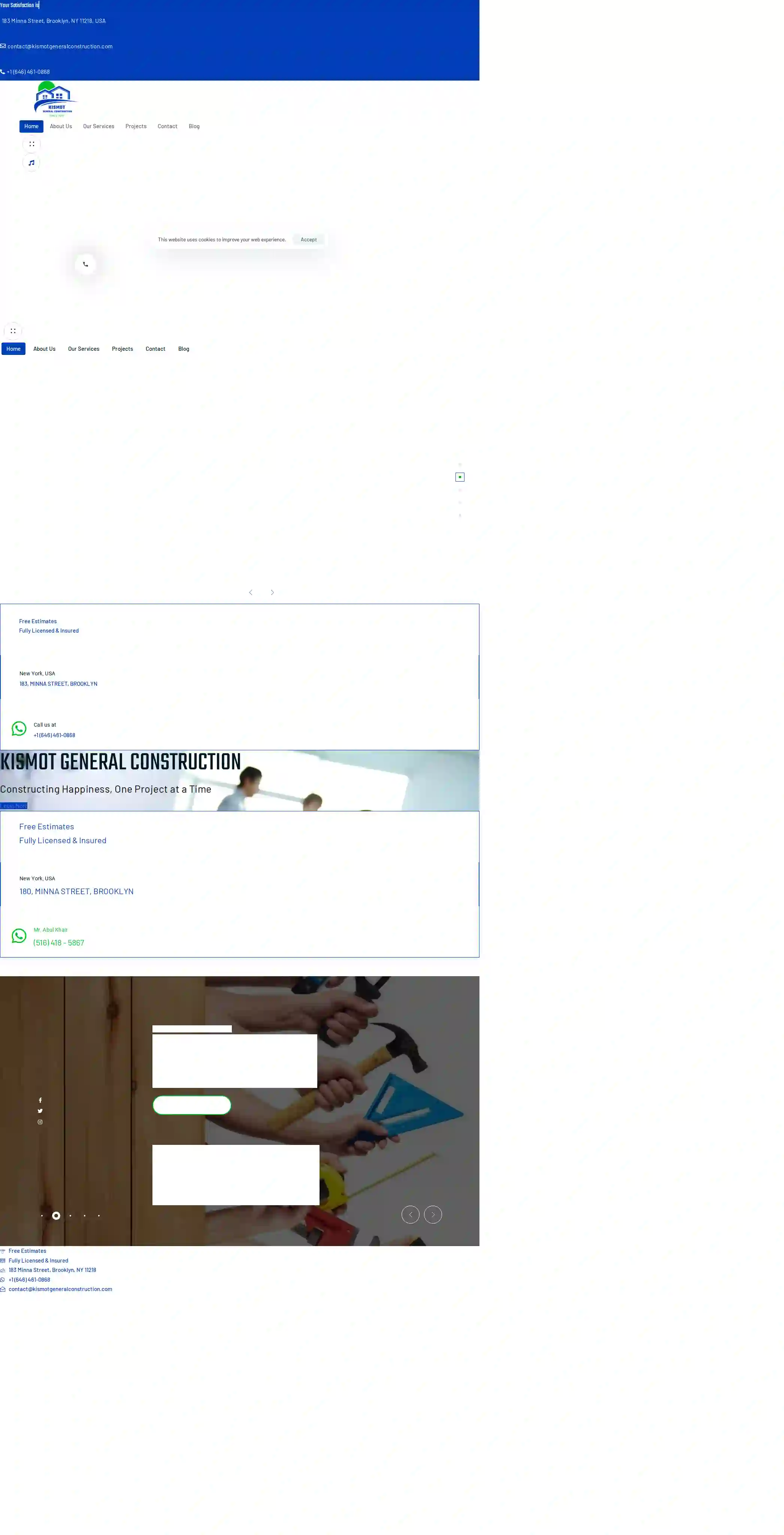Demolition Contractors Vienna
Find Demolition Contractors Near Me in Vienna
Get 3 FREE Demolition Companies quotes for your project today! Compare profiles, reviews, accreditations, portfolio, etc... and choose the best deal.

Linhares Excavating & Trucking, LLC
52 reviewsMattapoisett, USLinhares Excavating & Trucking, LLC: Your Trusted Partner for Excavation and Trucking Needs in Southeastern Massachusetts and Cape Cod For over 30 years, Linhares Excavating & Trucking, LLC has been a leading provider of excavation and trucking services in Southeastern Massachusetts and Cape Cod. We are a family-owned and operated business with a strong commitment to quality, customer satisfaction, and a dedication to providing our clients with the best possible experience. Whether you're a homeowner, contractor, or business owner, we have the expertise and resources to handle any project, big or small. Our team of experienced professionals is dedicated to providing you with the highest quality workmanship and exceptional customer service. We understand that your project is important to you, and we're committed to working with you every step of the way to ensure your complete satisfaction. We take pride in our commitment to safety and environmental responsibility. We use the latest equipment and techniques to ensure that all our projects are completed on time and within budget, while minimizing our impact on the environment. Contact us today for a free estimate and let us show you why Linhares Excavating & Trucking, LLC is the right choice for all your excavation and trucking needs.
- Services
- Why Us?
- Gallery
Get Quote
Ground Control Excavating Inc.
3.73 reviewsWarwick, USComplete Site Development, Excavation, & More… We provide complete land and site development services for projects of all sizes, including government, commercial, public, private, emergency, and residential projects. Ground Control Excavating, Inc. offers complete excavation services for residential and commercial projects. A premiere land-site excavating contractor, as well as, first-responder for emergencies and natural disasters in the NY area, we are committed to providing the highest level of quality to our customers throughout Orange, Sullivan, Rockland, Westchester counties and the entire Hudson Valley, NY area. GCE is based out of Warwick, NY. We provide complete site development, road development, rock hammering, rock crushing, concrete recycling, underground utilities, septic systems, drainage, top soil, and much more. We service Warwick, Monroe, Middletown, Goshen, Newburgh and the entire Hudson Valley. Experienced Construction Professionals We will work with you to achieve a common goal on time and on budget!
- Services
- Why Us?
- Gallery
Get Quote
Yankels Demolition
3.713 reviews341A Wallabout St, Brooklyn, 11206, USGold Standard in Demolition and Waste Management We are a licensed, bonded and insured company headquartered in Brooklyn, and serving the Tri State area. Yankel’s received a Buildzoom score of 104, placing us in the top 10th percentile of nearly 80,000 contractors nationwide. Look us up on Buildzoom.com under Atweek, Inc. Also read about us in our recent feature article in the Business Talk section of AMI Magazine. Where we Started YANKEL’S was founded in 1999 by Yehoshua Werzberger with only a small Ford Pick-up truck and a big vision. The Pick-up has since been replaced with an impressive fleet of trucks and mobile machinery; the big vision is still here, as is the personal touch. Having done all the leg work as he started and grew his business, Yehoshua has intimate knowledge of the work involved in every division of the company. Now at the helm of a full- service corporation and running one of the largest waste management facilities in the New York region, Yehoshua is still actively involved in every project. Why Choose Us We hold our customers in the highest regard, and their satisfaction drives every decision we make. Expect personalized attention, responsive communication, and a team that goes the extra mile to understand and fulfill your needs. Highly skilled and experienced professionals who are experts in their field. From project planning to execution, our team’s knowledge and expertise ensures a safe and successful demolition, meeting all necessary regulations and standards. We recognize the importance of delivering prompt results. With an unwavering commitment to efficiency, we execute every demolition with precision and speed, allowing you to move forward with your plans quickly and confidently. Reliability is the cornerstone of our reputation. Count on us to be there when you need us, delivering consistent and dependable services that you can trust. Our experience speaks for itself, and we aim to exceed your expectations every step of the way.
- Services
- Why Us?
- Testimonials
- Gallery
Get Quote
RND Construction
54 reviewsLocust Grove, Virginia, USServing Fredericksburg, VA & Surrounding Communities for Over 40 Years At RND Construction, we offer top tier excavation, land clearing and commercial construction services. We work diligently to meet our customer’s needs while adhering to industry standards in quality and safety. We are committed to completing our work with diligence and with extreme attention to detail. RND Construction is your top choice when it is time for your next job. Contact us today, our team is waiting to assist you! Expert & Professional Services Here at RND Construction we provide comprehensive services for homeowners and business owners across Fredericksburg, Virginia and the surrounding communities. We are experts in our field and are dedicated to providing superior workmanship and customer support. With over 40 years of professional experience, customer satisfaction is always our top priority.
- Services
- Why Us?
- Testimonials
- Gallery
Get Quote
Santucci Construction
4.812 reviews15 Travis Ln, 15 Travis Lane, Montrose, 10548, USThe Septic system Experts for more than 40 years. Santucci Construction Corp. places expertise and customer care above all else. For more than four decades, our specialists have provided skilled, responsible drainage, excavation and septic system maintenance throughout the Westchester and Putnam Counties area. Request Estimate More About Us How Can We help? The thoroughly experienced team at Santucci Construction is available to personally guide your needs. From property consultations to a full range of septic, drainage, and excavation services, we confidently advise the most innovative and effective enhancements for your unique home. As a family-run business for nearly half a century, our specialists are dedicated to precision, care, and direct customer collaboration.
- Services
- Why Us?
- Testimonials
- Gallery
Get Quote
JR & SONS EXCAVATING
51 reviewsEden, USAbout JR & Sons Excavating JR & Sons Excavating is a family-owned business with over 30 years of experience in the fields of Excavating and Landscape Architecture. We are dedicated to providing our clients with the highest quality service and workmanship. Our team is equipped with the best equipment and knowledge to safely and effectively complete any project you desire. Owner and Operator, Joe Chimera, focuses great emphasis on every individual's needs so that their project will be executed to the highest standards. Joe and his team are committed to exceeding your expectations and delivering exceptional results. We take pride in our equipment and utilize top products in our industry to ensure your project is completed efficiently and to the highest standards.
- Services
- Why Us?
- Gallery
Get Quote
UDC Site Development (UnderDogg Construction) Excavating, Demolition, Paving, Utilities and Septic Systems
4.723 reviewsBuffalo, USAbout us Family Owned & Operated UnderDogg Construction is a family owned and operated business servicing residential, commercial and industrial customers with projects of all sizes. We provide quality site development services in the Buffalo & Western New York (WNY) area. We are fully equipped to handle residential, commercial, and industrial projects. We are committed to customer satisfaction and quality workmanship. Trust UnderDogg Construction for all your excavating, demolition and site development needs. More About Us
- Services
- Why Us?
- Testimonials
- Gallery
Get Quote
Site Right Excavation, LLC
123 Main Street, Anytown, 12345, USSite Right Excavation: Your Trusted Partner for Excavation Services Site Right Excavation is a family-owned and operated business with over 20 years of experience in the excavation industry. We are committed to providing our clients with high-quality, reliable, and affordable excavation services. Our team of experienced professionals is dedicated to exceeding your expectations and delivering exceptional results. We understand that every project is unique, and we take the time to listen to your needs and develop a customized plan that meets your specific requirements. Whether you need site preparation, foundation excavation, utility installation, or any other excavation service, we have the expertise and equipment to get the job done right. At Site Right Excavation, we are committed to safety and environmental responsibility. We use the latest technology and equipment to ensure that our projects are completed safely and efficiently. We also strive to minimize our environmental impact by using sustainable practices and recycling materials whenever possible. Contact us today to schedule a free consultation and learn more about how we can help you with your next excavation project.
- Services
- Why Us?
- Testimonials
Get Quote
Matrix Excavation LLC
55 reviews9 Limekiln Rd., Hamburg, 07419, USMatrix Excavation LLC: Your Trusted Excavation Partner in New Jersey Matrix Excavation LLC, based in Hamburg, NJ, is your go-to source for all your excavation needs. We've been serving both residential and commercial clients across New Jersey and the tri-state area for years, building a reputation for top-notch service and expertise. Our team boasts extensive experience and training, including our owner, who brings over 30 years of experience to the table. We understand the unique challenges that come with excavation projects and are equipped to handle any complications that may arise. At Matrix, customer satisfaction is our top priority. From your initial call to the completion of your project, we ensure our highly skilled team delivers efficient and high-quality work that meets your expectations. Our Sister Company: Advanced Pier & Support Advanced Pier & Support, our sister company established in 2007, specializes in steel beam, mini pile, and helical pier construction services throughout the tri-state area. They can raise and lower houses, collaborate with Matrix Excavation LLC to stabilize your home, address foundation issues, remove under-home tanks, and support underground utilities. Advanced Pier & Support is also an approved Grip-Tite helical pier installer. Expertise and Funding Options Advanced Pier & Support is fully insured and licensed by the New Jersey Department of Environmental Protection. We offer our services at competitive rates to all our clients. Our skilled excavation contractors will conduct a thorough site evaluation and professionally manage every project you entrust to us. Thanks to the New Jersey Department of Environmental Protection, financial funding options are available for certain projects. While the fund is currently not accepting applications, you can still apply and be considered for reimbursement when funding is restored.
- Services
- Why Us?
- Testimonials
- Gallery
Get Quote
Kismot General Construction
533 reviews180, MINNA STREET, BROOKLYN, Brooklyn, USWelcome to Kismot General Construction Your most reliable source for comprehensive construction services in USA, Kismot General Construction offers a wide range of solutions to transform your construction vision into reality while ensuring quality and client satisfaction. About Us Founded in 2012 by Mr. Abul Khair, Kismot General Construction is a trusted name for reliable construction services in the USA. For over ten years, we've delivered high-quality projects, making our clients satisfied with our cordial and efficient work. Diverse Services: From roofing to renovations, we provide comprehensive construction solutions. Our craftsmanship and use of quality materials set us apart. Client-Centric: Client satisfaction drives our success, and we're proud to be a reliable, influential general construction company. Your Satisfaction is Our Ultimate Goal: Partner with us to bring your construction dreams to life.
- Services
- Why Us?
- Our Team
- Gallery
Get Quote
Over 22,076+ Excavation Businesses on our platform
Our excavation pros operate in Vienna & beyond!
ExcavationHQ has curated and vetted the Best Excavation Contractors in and around Vienna. Find a top & trustworthy pro today.
Frequently Asked Questions About Demolition Contractors
- Safety: Experienced contractors have the knowledge, skills, and safety training to execute demolitions safely, minimizing risks to workers and surrounding areas.
- Efficiency: Contractors have the specialized equipment and expertise to complete demolitions efficiently, saving time and reducing project costs.
- Compliance: Reputable contractors are familiar with local regulations and permitting requirements, ensuring compliance and avoiding legal issues.
- Waste Management: Contractors have waste management plans to handle debris responsibly, including recycling and proper disposal.
- Liability Protection: Insured contractors protect you from financial responsibility for accidents or damages during the demolition process.
- Size and Type of Structure: The method should be suitable for the structure's size, height, and construction materials.
- Site Location and Accessibility: The method should be feasible given the site's location, surrounding buildings, and access constraints.
- Environmental Considerations: Prioritize methods that minimize environmental impact, such as deconstruction or selective demolition if feasible.
- Budget: Different demolition methods have varying costs, so choose one that fits your budget.
- Safety: Prioritize methods that ensure worker safety and minimize risks to surrounding areas.
What is the difference between demolition and deconstruction?
Demolition: Typically involves bringing down a structure quickly and efficiently, often using heavy machinery and potentially explosives. The primary goal is to clear the site.
Deconstruction: Focuses on carefully dismantling a building piece by piece to salvage reusable materials. It prioritizes minimizing waste and environmental impact, often involving manual labor and specialized tools.
The choice between demolition and deconstruction depends on the project's objectives, budget, and environmental considerations.
What are the benefits of hiring a professional demolition contractor?
How do I choose the right demolition method for my project?
Can I do demolition myself?
What is the difference between demolition and deconstruction?
Demolition: Typically involves bringing down a structure quickly and efficiently, often using heavy machinery and potentially explosives. The primary goal is to clear the site.
Deconstruction: Focuses on carefully dismantling a building piece by piece to salvage reusable materials. It prioritizes minimizing waste and environmental impact, often involving manual labor and specialized tools.
The choice between demolition and deconstruction depends on the project's objectives, budget, and environmental considerations.
What are the benefits of hiring a professional demolition contractor?
- Safety: Experienced contractors have the knowledge, skills, and safety training to execute demolitions safely, minimizing risks to workers and surrounding areas.
- Efficiency: Contractors have the specialized equipment and expertise to complete demolitions efficiently, saving time and reducing project costs.
- Compliance: Reputable contractors are familiar with local regulations and permitting requirements, ensuring compliance and avoiding legal issues.
- Waste Management: Contractors have waste management plans to handle debris responsibly, including recycling and proper disposal.
- Liability Protection: Insured contractors protect you from financial responsibility for accidents or damages during the demolition process.
How do I choose the right demolition method for my project?
- Size and Type of Structure: The method should be suitable for the structure's size, height, and construction materials.
- Site Location and Accessibility: The method should be feasible given the site's location, surrounding buildings, and access constraints.
- Environmental Considerations: Prioritize methods that minimize environmental impact, such as deconstruction or selective demolition if feasible.
- Budget: Different demolition methods have varying costs, so choose one that fits your budget.
- Safety: Prioritize methods that ensure worker safety and minimize risks to surrounding areas.